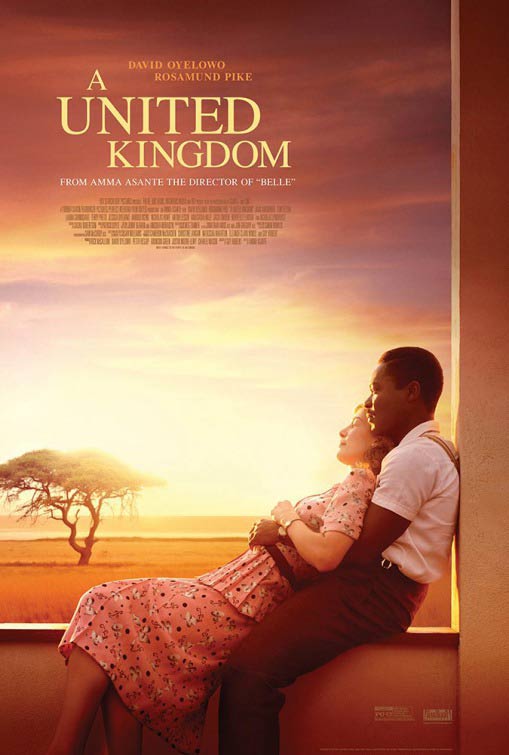 My interview with Stephen King and Richard Chizmar about their collaborative novella, “Gwendy’s Button Box,” is up at CD Online.
My interview with Stephen King and Richard Chizmar about their collaborative novella, “Gwendy’s Button Box,” is up at CD Online.
We were familiar with the name Seretse Khama from the No. 1 Ladies’ Detective Agency novels by Alexander McCall Smith. Mma Ramotswe, the protagonist of that series, often reflects about what a great man Sir Seretse was. The man who led Botswana into independence.
So, when we saw the trailer for A United Kingdom a couple of times last fall, we knew we wanted to see it. Khama was to be King of Bechuanaland, a tiny and poor nation just above South Africa. He studied law in England while his uncle ran the country as regent. However, he upset a lot of people by falling in love with and marrying a white woman. The predominantly black and repressed people of his nation weren’t eager to have a white sovereign—and her family and social circle weren’t thrilled by her choice of spouse, either. A national crisis ensued, with the British applying pressure because they didn’t want to annoy South Africa, in the throes of apartheid but Britain’s main source of gold.
The movie stars David Oyelowo and Rosamund Pike, and tells a reasonably faithful version of events from the 1940s through the 1950s. It’s a love story above all else, but also an interesting look at the birth of a nation and lots of political posturing, including a surprising revelation about a less than stellar moment in Churchill’s career.
We also saw The Light Between Oceans, starring Michael Fassbender, Alicia Vikander and Rachel Weisz. Fassbender’s character, back to Australia after World War I, signs on as the lighthouse keeper on the island of Janus. He meets Vikander and marries her, and the two live together in relative isolation. She has a couple of miscarriages and then a baby is miraculously delivered into their hands. They make a morally dubious decision and have to live with the consequences when the truth comes out a few years later. It was easy to understand why people do what they do in the film. Tough choices all around. After relating everything about their early lives in minute detail, I wish the film had spent more time looking at events after the major crisis instead of flitting pas years of the characters’ lives, where some undoubtedly interesting things must have transpired.
I’m about ¾ through a Norwegian series on Netflix called Occupied. It’s based on an idea from novelist Jo Nesbø. In the near future, Norway stops producing oil and gas to concentrate on green energy from thorium, leaving Europe in the lurch. The EU gets together and nominates Russia to occupy the oil-producing regions in the North Sea, forcing the ruling party in Norway to abandon their platform and continue to supply oil to the continent. It’s a fascinating look at the politics of the region and reflects on our current situation in interesting ways. In one memorable scene, the PM threatens to destroy another politician who wants to break away from the party by saying he will revel something about her actions after the occupation. “But that’s not true,” she says. “If I say it often enough, it will become true,” he responds. Sounds familiar.

